Part I: Interview with Shuichi Suzuki, New President of SAA - Four Decades of Global Business Experience – Grounded in Trust and Altruism
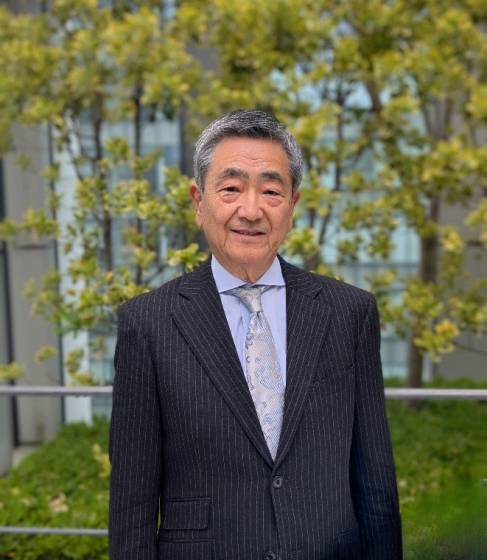
The Sasakawa Africa Association (SAA) welcomed Shuichi Suzuki as its new President.
Shuichi Suzuki has built a long career in international business at Sumitomo Corporation, a major Japanese general trading company, particularly in the fields of steel pipes and energy. His work took him to many parts of the world—including the Middle East, Southeast Asia, and Europe—where he was involved in developing partnerships and building sustainable growth. In later years, he played a key role in supporting industrial development and the stable supply of energy and industrial development through resource-related projects. After retiring from the frontline business in 2023, he decided to take on a new challenge: supporting agriculture in Africa through SAA. What made him, after nearly 40 years in the private sector, choose this path? In this interview, he talks about what drew him to SAA, how its approach aligns with his values, and what he hopes to achieve in the years ahead.
Part I: Four Decades of Global Business Experience- Grounded in Trust and Altruism
Suzuki’s long career in international business has been shaped by a steady focus on integrity, trust and contributing to society.
— Could you tell us about your professional background?
I joined a general trading company in 1982 and spent many years working in sectors such as steel—especially steel pipes and pipeline materials used in oil and gas—and energy. Both steel and energy are essential industries that form the backbone of society and the economy.
The company I worked for belonged to a traditional corporate group that placed a strong emphasis on ethics and trust. Two guiding principles were especially important: first, to prioritize credibility and reliability; and second, the philosophy of "Jiri-Rita Koushi-Ichinyo"—which can be translated as “benefiting both self and others, integrating public and private interests.”
— What does that altruistic philosophy mean to you?
It means not just seeking your own gain, but also considering the benefit to others—and to society as a whole. Even in for-profit activities, we were taught not to separate public and private interests but to align them, to seek mutual value. Mr. Yohei Sasakawa, chairman of The Nippon Foundation, speaks of “altruism” in his blog, and I feel a connection between that mindset and what I was trained in.
Any new business we undertook had to be based on trust and certainty. It was never about short-term profits; we focused on creating real, grounded value that served a broader social purpose.
— Entering the Trading Business with Caution and Purpose
Originally, our corporate group had a long-standing tradition of avoiding commercial transactions, considering them “prone to fleeting profits.” Indeed, one of the core our Business Principles reads: “One must not pursue easy gains or act rashly; rather, proceed with caution and deliberation.” At that time, we consistently held a deep awareness of the weight behind these words.
It is precisely because we entered the trading business as a latecomer—and in the unique position of a trading company—that we have taken our commitment to embodying the group’s core philosophy all the more seriously.
— Building trust and acting for others—what did that look like in practice?
In our day-to-day operations, trust and credibility were always the foundation. Before launching any project, we would seriously consider whether it had meaningful value to society.
From the 2000s onward, terms like SDGs and materiality became more mainstream, but for us, these ideas were a natural continuation of what we had already been practicing. They didn’t feel new—they simply gave a name to principles we already believed in.
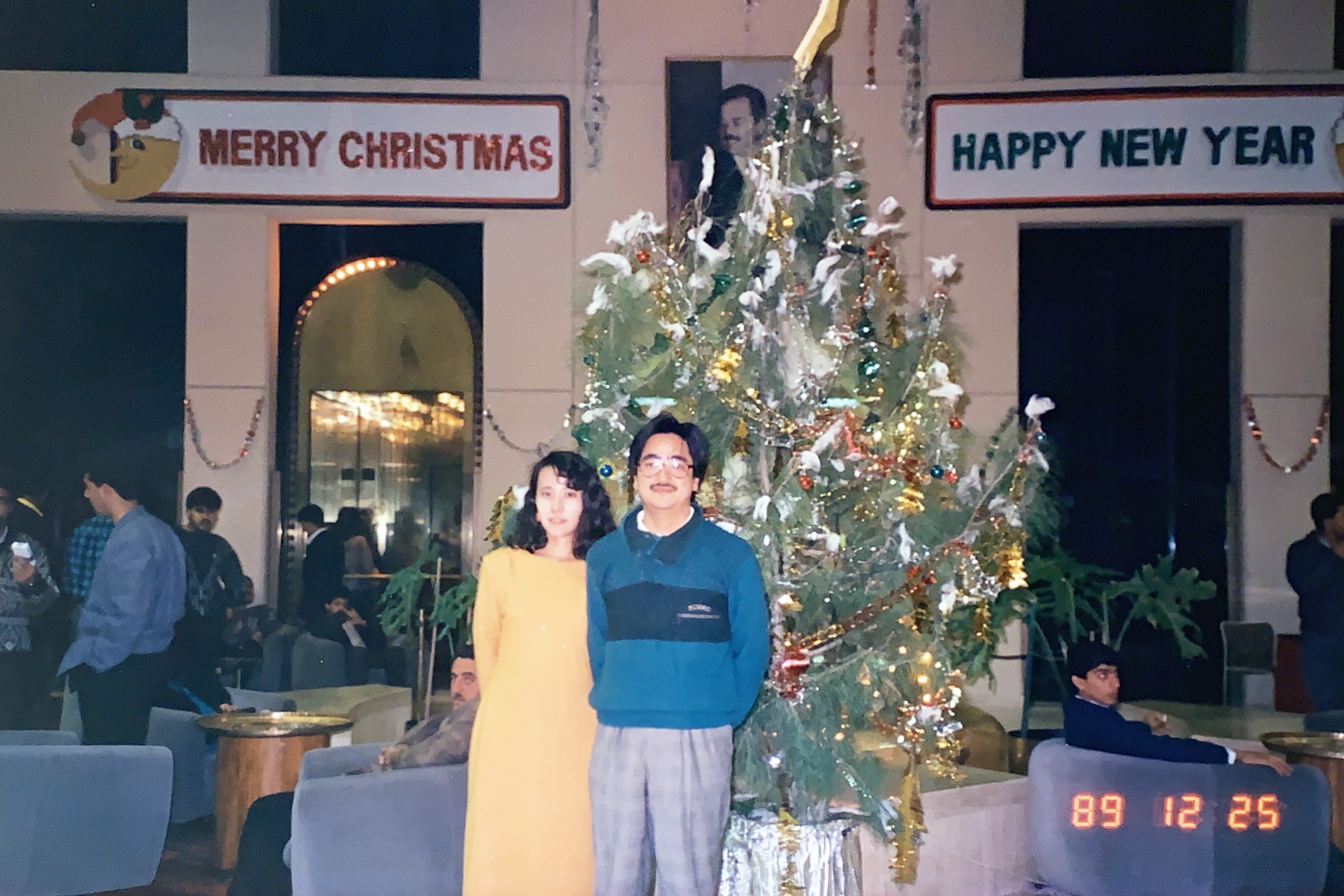 President Suzuki and his wife during their stay in Iraq. (In the background: a portrait of Saddam Hussein)
President Suzuki and his wife during their stay in Iraq. (In the background: a portrait of Saddam Hussein)— How did you learn the importance of sincerity and perseverance?
In international business, unexpected challenges arise all the time. I’ve experienced more than a few difficult situations, or what you might call “trial by fire.” Let me share three particularly memorable ones.
The first was during my posting to the Middle East in 1989–1990, when Iraq invaded Kuwait under Saddam Hussein’s regime. I was stationed in Baghdad at the time, and when the airport was shut down, I had to evacuate by overnight bus to Jordan. It took me two weeks to return to Japan, while some colleagues remained stranded for more than six months.
The second involved a major energy-related project that was disrupted by economic sanctions. Products had already been manufactured and delivered, but payment—amounting to tens of billions of yen—was at risk. With the support of the Japanese government and financial institutions, we negotiated persistently for one to two years and ultimately succeeded in collecting the payment.
The third was a pipeline construction project in Eastern Europe. Due to sudden geopolitical changes, we were informed that the project would be canceled just before completion. The project was worth hundreds of billions of yen. Through sincere negotiations with our business partners and relevant governments, we eventually found an alternative use for the pipeline, which led to successful payment collection.
These experiences taught me that no matter how large the risk, if you identify the core issue and respond with honesty and perseverance, a path forward will eventually emerge. Things rarely go smoothly, but with trust, persistence, and calm judgment, we can overcome even the most difficult challenges. That’s something I learned firsthand on the ground.
Part II: From International Business to the Sasakawa Africa Association (SAA)
Part III: Trust as a Compass — Building the Future of Agricultural Support for Africa
SAA Publications
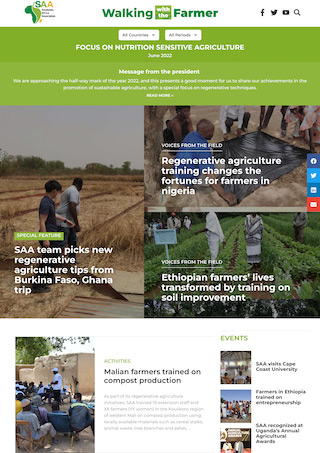
E-newsletter
"Walking with the Farmer"
SAA publishes a bimonthly e-newsletter reporting on SAA activities.
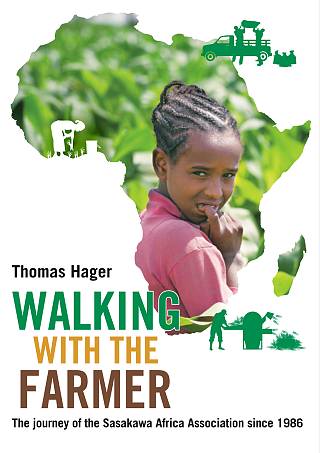
SAA history book
"Walking with the Farmer: The journey of the Sasakawa Africa Assoication since 1986"
This book chronicles the history of SAA from its inception to the present.
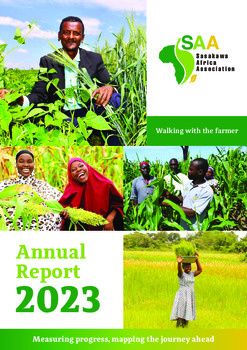
Annual Report
Annual Report FY2023
Annual Report FY2023 is available here.




